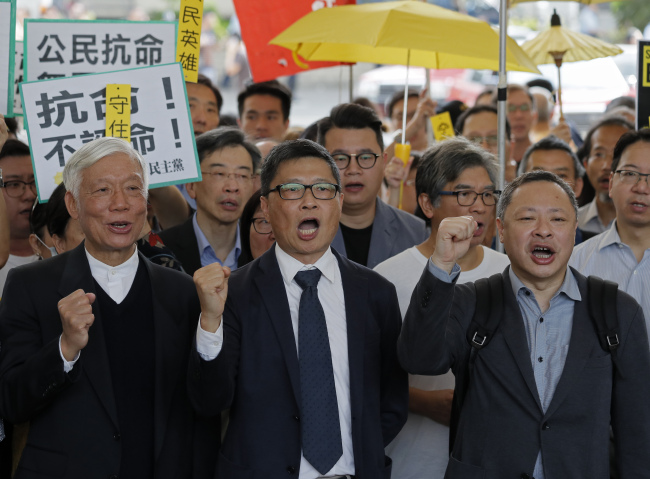HONG KONG, April 8, 2019 (AFP) - Three leading Hong Kong democracy campaigners will find out if they face jail Tuesday for their involvement in mass rallies, with their trial sparking renewed alarm over shrinking political freedoms under an assertive China.
They are among nine activists facing rarely used colonial-era public nuisance charges for their participation in the 2014 Umbrella Movement protests calling for free elections for the city's leader.
The charges carry steep jail terms of up to seven years and a court is expected to deliver its verdict Tuesday.
Among the most prominent members of the group on trial are sociology professor Chan Kin-man, 60, law professor Benny Tai, 54, and Baptist minister Chu Yiu-ming, 75.
The trio founded the pro-democracy "Occupy Central" movement in 2013 which joined the student-led Umbrella Movement a year later that brought parts of the city to a standstill for months.
 |
(Yonhap) |
Hong Kong's Justice Department eventually brought charges against the group leaders more than two years after the protest ended.
The Occupy trio face three charges each of conspiracy to cause public nuisance, incitement to cause public nuisance and incitement to incite public nuisance.
Human rights groups, including Amnesty International and Human Rights Watch, have described the prosecution as politically motivated, saying the use of vaguely worded public nuisance laws against protesters will have a chilling effect on free speech in Hong Kong.
- 'Trying to silence debate' -
"If prosecutors are successful, there is a real danger that more and more people will face charges for peaceful activism. The authorities appear intent on trying to silence any debate about sensitive issues in Hong Kong, especially those relating to democracy and autonomy," said Man-kei Tam, Amnesty's Hong Kong director.
The city enjoys rights unseen on the Chinese mainland, which are protected by the 50-year handover agreement between Britain and China, but fears are growing that those liberties are being eroded as Beijing flexes its muscles.
At the trial, prosecutors argued that the mass protests had caused a "common injury done to the public", who had been affected by the blockage of major roads, and that the leaders of the movement deserved to be punished.
On Saturday, more than 200 supporters, including outspoken Cardinal Joseph Zen, gathered for a service ahead of the verdict where the crowd prayed, sang songs and hugged.
The venue -- Kowloon Union Church -- was where the trio first announced their "Occupy Central" manifesto six years ago.
"What we are facing is the most powerful autocracy in human history and we have to take back our democratic rights from its hand," a tearful Tai told his supporters, referring to China's increasingly assertive control over the city.
Chan, who retired last year ahead of the trial, said he felt calm and grateful that he was able to spend more time with his family, especially his father, who recently passed away.
He had previously told AFP he became a marathon runner to prepare for the physical and mental challenges of a possible jail sentence.
The Occupy movement highlighted widespread frustration, especially among the young, over Hong Kong's direction but failed to win any reforms or concessions from Beijing.
Since then, many activists have been prosecuted, with some jailed, while a string of pro-democracy lawmakers have been barred. (AFP)








